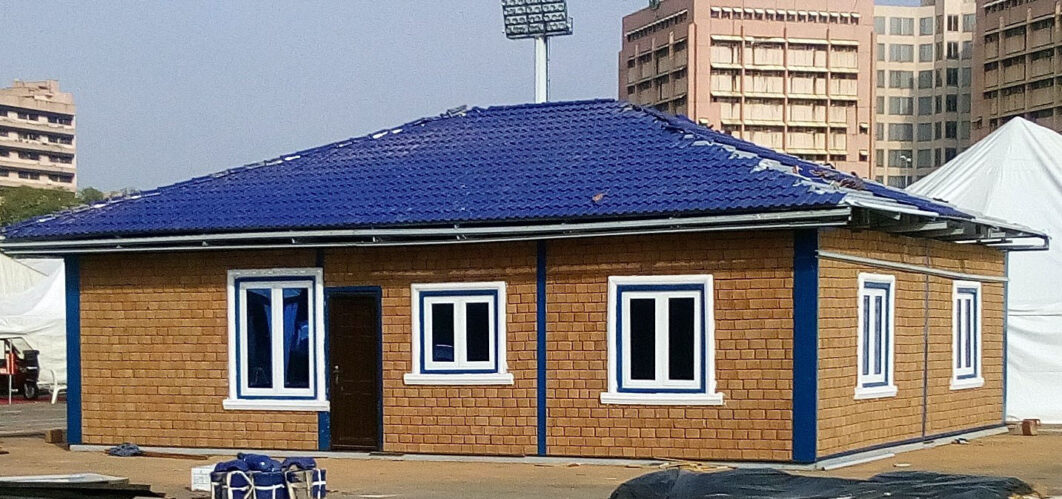 • Experts list strategies to boost ‘Made in Nigeria homes’
• Experts list strategies to boost ‘Made in Nigeria homes’
Due to the continued escalation of building materials prices and other economic variables, the increase in construction costs has spiked housing prices remarkably. Against this backdrop, experts are canvassing for backward integration in the construction industry and capacity development to produce and supply building materials within the country, writes CHINEDUM UWAEGBULAM.
With the construction cost hitting the roof due to inflation, built environment operators are seeking the Federal Government’s implementation of the National Housing Policy on using indigenous building materials for housing design and construction.
Under the 2017 National Housing Policy, the government was urged to pursue vigorously the adoption of functional design standards that will facilitate cost reduction, affordability, acceptability and sustainability, which will respond to the cultural and regional peculiarities of potential users; expand and improve the manufacturing base for building materials production from all available local materials and evolve a more efficient distribution system.
According to the policy, developing appropriate capacities to achieve sufficiency in producing basic building materials and components of acceptable quality from local resources will stimulate effective economic growth and development, and structured manpower development programme for domestic requirement and international engagement.
The document further called on the authorities to encourage the expansion of existing industries producing building materials from local sources such as clay, bricks, concrete products, timber, glass and tiles.
It wants collaboration with other developing countries in the development of technical know-how for building materials manufacture, and encouragement in the regional spread of building materials industries to stabilise cost, as well as widen distribution.
Notwithstanding the good intentions of the stakeholders to ensure a robust indigenous building materials market, the absence of effective indigenous technology for the production of building materials, new building materials factories due to high cost of finance; inadequate and inefficient Infrastructural facilities (roads and rail transportation, water, sanitation, and power supply have worsened the plights of manufacturers and investors.
Besides, the policy recommended that the government encourage the production and use of locally manufactured building materials by: providing incentives to, and creating the enabling environment for the private sector to encourage rapid flow of funds into building materials manufacturing through tax relief, accelerated depreciation and generous capital allowances are not adhered to.
Other strategies include strengthening the administrative, regulatory and institutional framework to ensure certification, registration and control of professional practices.
It also supports an integrated action programme for the organisation of the informal building materials marketing sector; restructuring and adequately funding the Nigerian Building and Road Research Institute (NBRRI); and encouraging the establishment of building materials testing laboratories by the private sector have not been supported by the government.
However, experts say that non-adherence to the policy negatively impacts housing delivery, which should reduce the housing gap.
According to them, since the housing policy seeks to solve housing problems, it is necessary to enhance the workability of the policy to achieve the goal.
Consequently, they stressed that the tide of overdependence on imported building materials can only be stemmed by increasing the local production capacity of these materials by implementing policies that encourage the procurement and use of locally sourced materials for government and private projects.
The immediate past president of the Nigeria Institute of Architects, (NIA), Enyi Ben-Eboh, said the major cause of high construction costs is the importation of a large percentage of the components of buildings and the lack of a strong industrial base to support the sector, as well as frequent supply chain disruptions, which also lead to scarcity and increased prices of essential building materials.
According to him, adopting innovative housing designs that focus on designs that optimise space and reduce material waste, as well as incorporate passive design strategies could lead to energy savings and bring down construction costs.
Besides, the adoption of modular and prefabricated building techniques can significantly reduce construction time and labour costs, while maintaining quality, promoting local materials production through the provision of support to local industries that will encourage the establishment and growth of local manufacturing facilities for building materials through incentives such as tax breaks and grants.
He also advocated the utilisation of indigenous materials by funding research that promotes the use of locally available materials such as clay, bamboo, and recycled materials that can be sourced at lower costs, as well as the institutionalizing of workforce training programmes to upskill workers in new construction methods and use of advanced materials.
Ben-Eboh said the government should review the National Housing Policy to support local materials production and usage, while also developing standards for locally produced materials to ensure quality, encourage consumer confidence and address regulatory barriers.
He also made a case for partnership with universities, polytechnics and technical colleges to create curricula focused on innovative construction techniques and local material usage, while providing the necessary funding for research into developing alternative local materials and methodologies.
Ben-Eboh further suggested the establishment of innovation hubs to encourage entrepreneurship and collaboration among the various construction industry professionals in evolving new materials and methodologies, as well as the establishment of training programmes for workers in the construction industry to enhance their skills in local material production and sustainable construction practices.
“Architects and engineers must as a deliberate policy, incorporate local materials in their project designs and specifications in such a manner that meets both aesthetic and structural requirements, thus demonstrating their viability and effectiveness. In addition, they should develop creative design solutions that effectively utilise local resources, thereby showcasing their potential for wider adoption,” he said.
He also said architects and engineers should be at the forefront of actively advocating the use of local materials by educating clients about such benefits as sustainability, cost-effectiveness, and community support while staying informed about local materials and their innovative uses through continuous professional development initiatives.
The President, Real Estate Developers Association of Nigeria (REDAN), Prince Akintoye Adeoye, linked increasing construction costs to the high cost of land, building materials, financing, exchange rate volatility and inflation, high transportation costs for moving building materials, securing building permits and approvals, double taxation and shortages of skilled workers such as electricians, plumbers, carpenters, and masons.
Adeoye urged the government to promote local materials by educating Nigerians about the benefits of using locally produced building materials and shifting preferences away from imported materials by showcasing successful projects.
Other strategies, he enumerated include the use of digital tools for housing design and construction methods to increase efficiency and reduce costs, the adoption of incremental housing models, which allows homeowners to expand their homes over time.
He also called for sustainable construction materials and energy-efficient designs that encourage the use of sustainable materials, such as recycled and reused materials, to lower costs and minimise environmental impact, as well as promote the use of energy-efficient construction methods and materials to reduce long-term operational costs for housing.
REDAN argued that government support for local materials and affordable housing design through policies will encourage the use of local materials and promote affordable housing designs, as well as investment in research and development of new, cost-effective building materials and construction techniques.
He said Nigerian entrepreneurs, foreign investors, and scientists should collaborate with institutions like the Nigerian Building & Road Research Institute (NBRRI) and the National Agency for Science and Engineering Infrastructure (NASENI) to innovate local building materials and production techniques.
“The government should create a conducive environment for local investors and industrialists by revisiting the local content bill. Additionally, strategies must be developed to sustain and scale up local manufacturers, while ensuring that building products meet quality standards,” he added.
A property developer and Managing Director, NISH Affordable Housing Limited, Dr Yemi Adelakun, said major causes of high construction costs include the foreign exchange implications of imported technology and materials, duties and taxes and dependence on trained artisans from neighbouring countries.
According to him, no nation can sustain dependence on foreign expertise and materials, especially in the construction industry.
He emphasised that Nigeria needs to revolutionise national learning and capacity building as soon as practicable. “We should stop over-dependence on contract awards to foreign companies and start encouraging Nigerians to get involved in construction and domestic production of materials.
“Government should patronise Nigerian contractors and employ young professionals and artisans to handle construction projects using direct public works programme. Professionals and artisans should also be organised into cooperatives to enhance synergy and build capacity,” Adelakun said.
He said special incentives should be granted to building materials companies to facilitate competitiveness, while technology transfer and capacity building should be a precondition for foreign contracts.
Adelakun said a backward integration strategy is ideal for Nigeria’s construction industry. “This requires a concerted and collaborative effort between the public and private sectors to develop the capacity to produce and supply building materials within the country.
“The government should provide building materials manufacturers with incentives like tax holidays, off-take guarantees, infrastructure development, easy access to land and efficient approval processes. Designs should be tailored to materials readily available in Nigeria. Building materials manufacturers should imbibe cooperatives’ self-help principles to enhance their productive capacity,” he said.
Government policy on housing should consider materials available locally. The government should also support and fund research programmes towards the development and adoption of domestic building materials. Universities should be at the forefront of this research and development endeavour.
Young professionals should also be given opportunities to work on public works projects that will enhance their knowledge, exposure and entrepreneurship. Competition with handsome rewards should be organised to promote innovation and skills development. Professionals and their institutions should be proactive in cost-effective technologies and large-scale development of building materials domestically.
Ben-Eboh further urged the government to simplify regulatory processes for projects utilising local materials by facilitating faster approvals and reducing bureaucratic bottlenecks.
“Government can also provide such financial incentives, as subsidies or grants, for builders and developers who commit to using local materials in their projects and support research and development initiatives, focused on improving local material production and promoting their use in construction.
“Government can also launch awareness campaigns that highlight the benefits of local materials, aiming to educate both the public and professionals about their advantages and in the process, celebrating successful projects that have used local materials to inspire confidence and encourage similar practices in future developments.”






